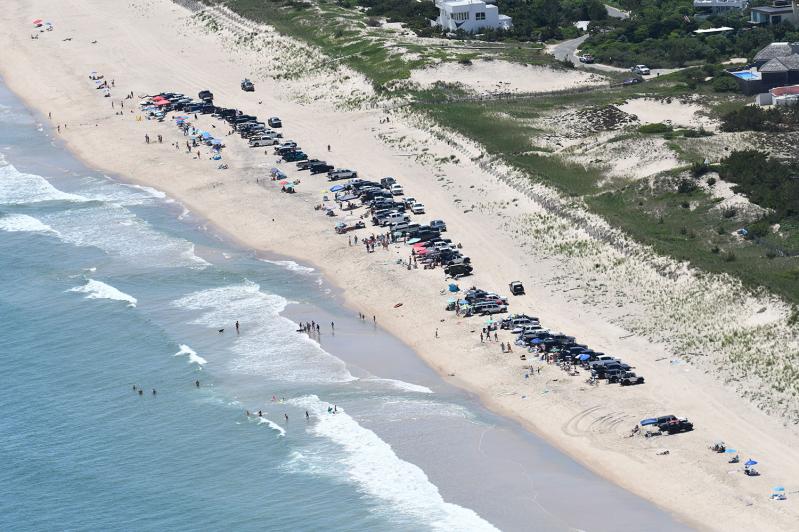Fishermen and other residents of East Hampton Town who have been prevented from accessing a 4,000-foot stretch of Napeague ocean beach commonly known as Truck Beach have a new ally in an outside attorney for the town trustees.
On Monday night, the seven trustees at a virtual meeting approved a resolution appointing Daniel Spitzer and the Hodgson Russ law firm, which represent the trustees as defendants in the long legal battle over public access to the beach in question, to also represent residents of the town who wish to use the “reservation” in an 1882 deed that the trustees believe allows access to the beach for fishing and fishing-related purposes.
In 1882, the trustees, who own many of the town’s beaches on behalf of the public, conveyed about 1,000 acres on Napeague to Arthur Benson, but in the deed “reserved to the inhabitants of the Town of East Hampton the right to land fish boats and netts to spread the netts on the adjacent sands and care for the fish and material as has been customary heretofore on the South Shore of the Town lying westerly of these conveyed premises.”
The resolution passed on Monday also allows the trustees to join a countersuit filed by the town against the property owners associations representing people with houses along the disputed stretch of shoreline and in any necessary new proceedings, including any action on behalf of individual residents or any class of residents.
The resolution points out that “the fishing reservation in the Benson deed created a public easement” to use the beach “for fishing and fishing related purposes, which right is now threatened by the actions of the homeowners associations.”
“We are thinking that the proper way to go is a class action case,” Mr. Spitzer told the trustees.
The trustees’ resolution is the latest development in a more-than-decade-long legal battle that ultimately determined that the property owners’ control extended to the mean high water mark.
Overturning a 2016 State Supreme Court decision, the State Appellate Division ruled last winter that town residents have no inherent access rights to the beach in question. A temporary restraining order issued last June reiterated the Appellate Division’s decision and prompted the town to post signs and barriers prohibiting vehicle access at the beach. That led to instances of civil disobedience on the beach in June and October during which fishermen and their supporters drove across the beach.
The property owners contended that the town failed to adequately follow through on the February 2021 order and asked that the court hold the town in contempt. A contempt hearing recently concluded in State Supreme Court in Riverhead
The trustees’ meeting on Monday followed another on Saturday, at which Dan Rodgers, an attorney representing the 14 fishermen who were cited for trespassing in the October protest at the beach, briefed his clients on his nascent partnership with Mr. Spitzer. Mr. Rodgers will serve as co-counsel.
“Remember,” he told the fishermen, “the reservation doesn’t say trucks on the beach, the reservation says fishing on the beach. But the bottom line is, if you folks can’t drive on the beach, you can’t fish. It’s always been that way. And I use the argument that 140 years ago when they made this reservation, when a whale washed up on the beach, nobody cut it up and threw it over their shoulder. . . . They used carts, they used horses, they used whatever conveyances they could get back in 1882. The point being, the fact that they didn’t have trucks back then is not a valid argument” to prevent trucks on the beach now, he said.
Wheeled vehicles have always been important to fishing at the ocean, both attorneys told their respective audiences. “We don’t believe that it’s a legal issue about whether or not the latest technology is prohibited simply because there were no automobiles being used in 1882,” Mr. Spitzer said.
Statements from the Appellate Division and the property owners’ attorneys “do not seem consistent with the language of the reservation,” he said. “The current interpretations that are being promoted by the homeowners is basically ‘This is our beach, nobody is allowed to use it.’ In my opinion, that’s not what it says.” There are 1,802 residents with a fishing license “who are basically being deprived of a right that they have to use those fishing licenses on property that was expressly reserved for fishing.”
The two attorneys have discussed “an action to get at this exactly,” to force a resolution of the reservation’s true meaning, Mr. Spitzer told the trustees. Recreational fishermen, including a former Trustee, Rick Drew, could be parties to any action, he said. “In a perfect world, the homeowners would reach out to protect their own interest and say to the community ‘We don’t have a problem with you giving a permit for people with fishing licenses, or commercial fishermen, to use our property, just as this allows, but we want your help in policing it so that we don’t have people doing wheelies on the beach and sunbathing on the private portion of the beach.” He acknowledged that the property owners’ attorneys are unlikely to be receptive to such an idea.
He asserted that the trustees are within their rights to take legal action, but also that they might work with the town, “and hopefully the landowners, to create a permit system that reflects what the express reservation specifically said, and protect this important industry for the town.”




